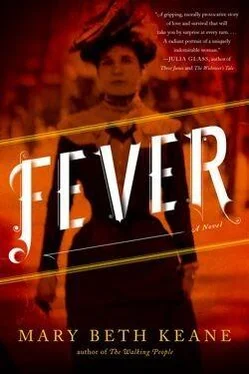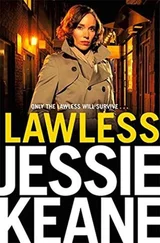• • •
What will I say? She demanded of herself three months later, the next time she walked up to the DOH office where she’d once again sign next to her name, her residence, her place of work. It was August now, and they were baking with blackberries and apricots. She brushed flour from her sleeves and the front of her dress. She washed her hands thoroughly, and loosened the pins that kept her hair in a severe bun while she was mixing and beating and pouring. She told them at the bakery that she had to bring an ill neighbor to the hospital, and Jacob, the manager, told her to be back in one hour. One day, when she got the courage, she might march Mila and the Borriello boys to the DOH headquarters to say that she’d cooked for them, and they had survived, but then they’d just say what they always said, which was that it didn’t matter. Some people were immune. Some people had protection built in to them already. And sometimes she wasn’t infectious. Maybe she’d write to Mr. O’Neill about helping her get back to cooking. But not today, not yet, and when the man asked her where she’d found employment since her last visit, she was about to tell him, getting ready her argument that baking and cooking were entirely different occupations, when instead, she heard herself say that she worked in a shop, as an assistant.
“What kind of shop?” the man asked.
Mary brought forth her thickest brogue. “Oh, one of them kinds of shops that sells nice things to rich people. Pretty-looking things.”
As he scrutinized her, she tried to look and feel as blank as possible — a middle-aged woman with a thickening waist, poor posture, ugly shoes. She blinked. She scratched behind her ear.
“Trinkets?” he asked. “What sort of pretty things?”
“I dunno. Colorful things. I don’t see much of the selling as I work in a room at the back.”
It was all true, in a way. All true if you slanted it a bit, made the colors run together.
A girl came in with a stack of files and placed them on his desk. He sighed, pushed the pile to the side, and then scribbled “shop assistant” in Mary’s file and handed it to her. “Put the address,” he said. She took the pen from him and held it in the air for a moment as her mind raced and she realized she was about to write the real address. She changed the street number by one digit. An honest mistake, she could say later. I wasn’t entirely sure. She signed. He signed. Then he summoned the secretary and told her to lead Mary down to the basement to give her sample. Mary knew her own way to the small room, but she was escorted anyway, and once there a nurse made conversation about the weather, about Vinie Wray being shot outside the stage door of the Hippodrome, about the Sanitation Department’s new plan to remove garbage at midnight, about a shipping company owned by J. P. Morgan announcing that it was building the world’s first unsinkable ship, while Mary squatted over a bright white bucket and prayed to God for something to happen so that she could be on her way.
“Do you want me to get the bulb and syringe?” The nurse asked.
“No, I do not,” Mary said. “I want you to leave me alone.”
“Can’t do that, ma’am.” She tapped Mary’s file.
From her left Mary heard the traffic of the hallway on the other side of the locked door, and on her right the sounds of the street floated in the screened window. The nurse closed her eyes and leaned against the wall.
“Stuffy in here,” she said. “Feel anything?”
“I’m not doing this,” Mary said, pulling up her underthings, straightening her skirt.
The nurse took a step forward. “It hasn’t been thirty minutes. Look, why don’t we take a break and try again in a while. You don’t want to have to come back tomorrow, do you? Can I bring you a glass of water?”
“You can drown yourself in the river if you like,” Mary said as she walked across the room and opened the door. “I’m leaving.”
Twenty minutes later she was cracking eggs into a ceramic bowl.
She didn’t go back the next day, or the next week. She expected them to look for her, but they didn’t. Summer ended, and in the autumn she and Evelyn baked with pumpkin, nutmeg, clove. Sometimes, when Jacob said that a customer had requested fresh peaches or sliced strawberries placed on their cake or pie, she thought back to what they told her on North Brother about heating food until all the germs would die away. “Do you know what a germ is?” they’d asked her, like she was a child sitting for an examination. Only later, back in her hut, facedown on her cot, the rush of Hell Gate just twenty-five yards from her gable, would she try to make sense of what they told her about invisible microbes that floated in the air, that traveled up the nose and into the mouth. So many years later, it still sounded like a fairy tale meant for children, a little world too small for the human eye to see, or like religion, in that they were asking her to believe such a thing existed without giving her a chance to look at it, hold it, understand it.
Standing there at her station, so far from North Brother, with the quiet of the kitchen, the familiar shape of Evelyn’s bent neck, the light from the window shining over her work, the sound of bells jangling on the door up front and then the different bell of the register drawer opening and closing, the rhythmic beat of her spoon against the bowl as she worked it ’round and ’round and ’round the batter, she felt peaceful. She straightened slices of pear. Using her fingertips, she arranged blueberries into a neat semicircle, and then strawberries alongside. Quick as a blink she swiped her finger into the ice-cream bowl to see if it needed more sugar. She licked quickly from the mixing spoon and then, without thinking, plunged it back into the bowl. She made a sheet cake that would serve forty with fresh whipped cream between the layers. The layers slid a bit while she was anchoring them. She touched them into place. Touched them again. Pushed the cream to the edges with her thumb. At the end of the day, when she washed all the stickiness from her hands, she recalled all those moments of touching but she couldn’t see how one small movement, one nudge, one lick, something all cooks do, all bakers, all mothers and grandmothers who had to see if a thing was finished, if it tasted right and good, how something so inconsequential, something she barely noticed herself doing, could mean anything.
She went back to the DOH three months later — November 1911—signed the papers again, skipped the sample, and once again she walked out of the building without being stopped. In the bakery, once December arrived, they crushed bits of peppermint and sprinkled them over icing. Mary stayed in her corner of the kitchen, Evelyn in the other, and they worked in peaceful silence. Sometimes sugar burned, sometimes pots boiled over, but for the most part their movements in the kitchen were harmonious, one pushing a pan into the oven when the other pulled one out. If Mary’s timer rang while Evelyn was near the oven, she would open it and check on what was in there, and Mary did the same for her. She worked hard, stayed on her feet for ten hours straight, ate a dinner of burned corners and day-old bread, and every night she went to sleep happy.
Another Christmas, another bitter winter. The Hudson froze and children skated on its shores. Several times Mary thought she spotted Alfred, once entering the bakery, another time loping up the avenue, but it was never Alfred, and she hoped that wherever he was he was warm and dry. Maybe he’d gone to Canada. He’d always said New York was too small for him, too cramped. Maybe he’d gone south. With so many Negroes moving north it was said that there was work down there. Or maybe he was still in New York City, back with Liza Meaney. Maybe they’d married and gone upstate. Maybe Liza had helped him back on the wagon and gone through with the marriage. Maybe they’d had a child together.
Читать дальше












